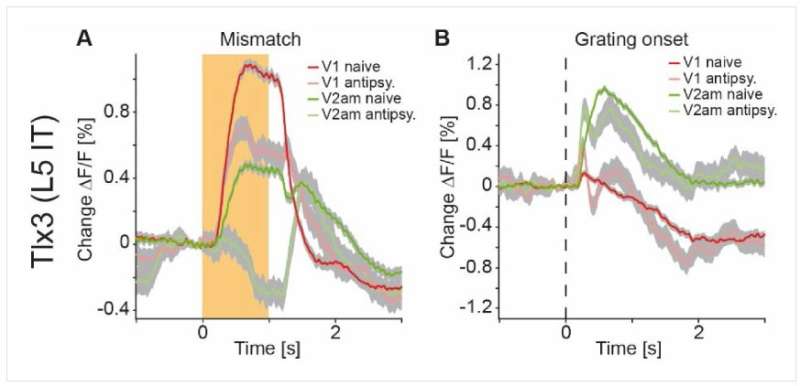
Antipsychotic drugs are used to treat and manage symptoms of many psychiatric disorders, but their mechanisms of action remain a mystery. FMI researchers have found that antipsychotics reduce long-range communication within a specific layer of the brain cortex—a finding that may explain how these medications work.
Antipsychotic drugs are the classic treatment for schizophrenia, but they can have little or no effect for some patients. These medications are known to dampen the transmission of certain neurotransmitters in the brain and reduce delusions, hallucinations and other symptoms of psychosis. However, how exactly they work remains unclear.
Matthias Heindorf and Georg Keller measured the neuronal activity of mice as the animals moved on a treadmill. When mice were given a common antipsychotic called clozapine, the communication between neurons located in layer 5—a deep layer of the brain cortex—was substantially decreased, the researchers found. The study is available as a reviewed preprint in the journal eLife.
Layer 5 neurons in brain areas involved in speech are typically activated by speech sounds, and hallucinations and delusions may result from the spurious activation of speech-processing neurons by non-speech sounds, Keller explains. “If layer 5 neurons are activated from some other part of the brain, then you might hear voices that aren’t there,” he says.
Clozapine and other antipsychotics act by reducing the long-range communication between specific areas of the cortex, the researchers found. “Cortical areas are densely connected with each other, and antipsychotic drugs reduce all of those connections selectively in layer 5,” Keller says. With antipsychotic drugs, he adds, “these neurons become less easily influenced by other neurons—they become less gullible.”
The findings not only shed light on a potential mechanism of action of antipsychotics, they could also offer hints about what happens in the brain of people with schizophrenia, Keller says. “We speculate that there is an increase in influence between cortical areas in schizophrenia patients, and antipsychotic drugs might reduce this influence.”
More information:
Matthias Heindorf et al, Antipsychotic drugs selectively decorrelate long-range interactions in deep cortical layers, eLife (2023). DOI: 10.7554/eLife.86805.1
Journal information:
eLife
Source: Read Full Article